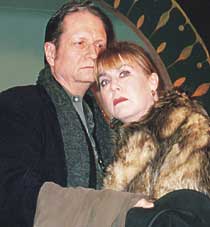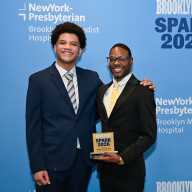These are difficult times. And many people
are looking to ease their minds with light entertainment. Still
others believe the stage comforts on a much deeper level – by
revealing the human condition and uniting us in our shared humanity.
This week GO Brooklyn reviews two dramas written by vastly different
authors who live or lived in different times and different places.
What they have in common is an uncommon insight into the human
psyche and the human condition.
In these days of post-modern mayhem, when plays may lack plot,
linear action and even distinguishable characters, it’s hard
to realize that Anton Chekhov, with his plodding pace and dense
dialogue, is considered one of the founders of modern theater.
Yet, Chekhov’s works, closely identified with the innovative
Moscow Art Theatre – founded in 1898 by Konstantin Stanislavski
and Vladimir Nemirovich-Danchenko – forged the way for a more
naturalistic and at the same time lyrical drama that depicts
ordinary people living ordinary lives.
"The Cherry Orchard," first presented in 1904, was
Chekhov’s last play before his death from tuberculosis at the
age of 44 in that same year. The play reflects the major political
and economic upheavals that would eventually lead to the Russian
revolution. But it is also a brilliant portrayal of how those
sweeping changes affected the everyday life of peasants and gentry,
old and young, students and servants.
The Boerum Hill Arts Center presents "The Cherry Orchard"
with a text adapted by director Steven Hart and staging that’s
in a "rehearsal mode," allowing the audience to see
actors as they make their entrances and exits on the side of
the stage or pick up props from the prop table. Hart writes that
this has been done so audiences "can share more in the discovery."
"In our production, we have set aside the distance created
by time and culture. In a sense, that is really what we do in
rehearsal. You see us at work with the nuts and bolts showing,"
he writes in the theater program.
This reviewer, however, didn’t see how this particular staging
had much of an impact at all.
For the most part, this is quite a traditional production. Its
strongest elements are capable acting and a faithful rendition
of Chekhov’s insightful and ironic dialogue. Its weakest link
is the lack of action that characterizes so much of Chekhov’s
work. "The Cherry Orchard" is a great play, provided
you can stay awake until the end.
The play is about the landowning family, the Ranevskys, who lose
their estate and beloved cherry orchard through poor management,
neglect and impracticality. Lopakhin (Christian Wijnberg), a
clever businessman, advises Madame Ranevsky (Coulter Kent) to
chop down the orchard and build houses on the land. But neither
Madame Ranevsky, her daughters Anya (Stephanie Wang) and Varya
(Victoria Boomsma) or their uncle Gayef (Steven Hart) can bring
themselves to commit this horrendous act.
The Ranevskys aren’t even successful in love. Madame Ranevsky
is the widow of an alcoholic and the scorned mistress of more
than one lover. Despite Madame and Varya’s efforts, they are
unable to get Lopakhin to propose marriage to Varya.
The family is surrounded by a collection of servants, hangers-on
and inept suitors no more capable of dealing with the vicissitudes
of life than the Ranevskys. The elderly servant, Firs (David
Greenwood), who longs for the days of serfdom, most eloquently
represents the doomed old world, just as Lopakhin illustrates
the rising new class.
The cast of "The Cherry Orchard" is more than adequate,
but less than outstanding. Walter Brandes is quite funny as the
clumsy whining clerk Ephikhodof. And Kent delivers lines like,
"Thank you, Firs. I’m so glad you’re still alive,"
with perfect aplomb. But the production lacks a certain vitality
that is indispensable in a Chekhov play if a director hopes to
compensate for the lack of an intriguing plot and compelling
action.
The play also would have been vastly improved by costuming that
reflected 19th century Russia rather than 21st century America.
And even given our passion for multiculturalism, the presence
of a multi-ethnic cast in a classic Russian play was somewhat
disconcerting.
Like cherries, this "Cherry Orchard" is succulent but
has its pits. Happily, the production gives audiences a well-deserved
break from the mindless musicals and stale comedies that play
too big a role in community theater. If not totally successful,
The Boerum Hill Arts Center’s "The Cherry Orchard"
is certainly a worthy effort.
’Side Man’
On the eve of leaving home to set out for a new life and a new
career in California, Clifford Glimmer goes to visit his jazz
musician father, Gene Glimmer, who is playing at the Melody Lounge.
While listening to his father’s trumpet, Clifford meets Patsy,
the often wooed, sometimes married, waitress and jazz "groupie."
When Patsy asks Clifford about his mother, Terry, who is deranged
and dying, his mother briefly appears, screaming that Clifford
should not visit his father, who has destroyed her life. The
rest of Warren Leight’s "Side Man," is a series of
flashbacks, intermittently narrated by Clifford, explaining exactly
how Gene precipitated his mother’s downfall.
"Side Man," now on stage at the Heights Players’ theater,
directed by Ted Thompson, was first produced at the Powerhouse
Theatre at Vassar College in July 1996, subsequently presented
in New York City at the CSC Theatre in a production directed
by Michael Meyer, and finally brought to Broadway in a Tony award-winning
production by the Roundabout Theatre, with Edie Falco (who later
left to film the first season of "The Sopranos") as
Terry, Christian Slater as Clifford and Frank Wood as Gene, a
role that earned him a Tony award.
On one hand, "Side Man" is a coming-of-age story; after
spending his young life taking care of his alcoholic mother and
feckless father, 30-year-old Clifford Glimmer (Stephen Heskett)
finally realizes that he needs to leave both to become a person
in his own right.
But "Side Man" is also the story of Clifford’s father,
Gene (Jeff Carpenter), who like the playwright’s father, was
one of the last great sidemen of the jazz period, an era that
ended with Elvis Presley’s hip-shaking appearance on the Ed Sullivan
Show.
And even more important, it is the story of Terry (Christina
Cass) the foul-mouthed flutist who gave up her admittedly not
very promising career to live with, then marry, a musician who
clearly loved his horn more than he loved his wife and child.
Leight may have thought he was paying tribute to his father,
but one suspects it was his mother he really loved.
If the plot of "Side Man" seems macabre and maudlin,
the play is anything but. This is mostly thanks to lines like,
"What do you say when an ex-junky compliments your veins?"
or "She’s working her way through medical school one intern
at a time," or "The National Endowment for the Arts
is for classical musicians. Unemployment is for jazz musicians."
The funniest lines are delivered by Gene’s three musician friends,
Al (Steve Platt), Ziggy (Bernard Bosio) and Jonesy (Jonathan
Lovett), a groovin’ Three Stooges who combat the tragedy of life
with humor, compassion and unbridled love for their music.
Patsy (Maureen Vidal in a tight dress and teased hair) also delivers
a fair share of the humor.
No doubt, Leight has written a certain ambiguity into his play.
Is "Side Man" about Clifford, who tells the story and
initiates the action; Terry, who suffers the most; or Gene, who,
according to the title, should be the central figure? The answer
lies in the director’s choice and the actors’ abilities.
In Ted Thompson’s "Side Man," the very capable Heskett
is sarcastic and sincere, but he does not and should not be too
emotionally engaging. His narrative is the element that allows
the audience to step back from the action and observe without
judging.
Carpenter is as low-keyed but not as likeable or convincing as
Jimmy Stewart. It’s almost impossible to care about what happens
to a man who cares so little himself. It’s hard to say whether
this is Carpenter or Thompson’s interpretation, but either way,
the result is a weakening of the role.
Perhaps this production might have been more powerful if Carpenter
had made Gene more aware of his failings and pained by their
consequences – by what he has done to his wife and not done for
his son. But fortunately, while Carpenter wanders in and out
of scenes, Cass’ superb performance steals the show.
Despite the fact that her accent wavers between Italian and Irish
so that we’re not sure whether she comes from Boston or New York,
Cass’ performance is close to perfect. She rages. She whines.
She cries. She is innocent and obscene, world-weary and wide-eyed.
When she is pregnant, we feel the weight of the baby she is carrying.
When she is old and drunk, we feel the weight of her pain.
One wonders, should the play have been called "The Side
Man’s Wife"?
Bill Wood has designed a two-level set that allows the action
to switch seamlessly from the jazz scene to the Glimmer’s New
York apartment. Pete Lopez’s sound work gives the audience a
real treat with some superb recorded jazz music.
Unlike the light-hearted fare more frequently offered by the
Heights Players, "Side Man" is a probing drama not
meant for the entire family. But at a time when this city, in
fact the entire nation, is wrestling with thoughts of life and
death, struggle and survival, "Side Man" gives us all
a compelling reason to get out of the house and into the theater,
where such matters are brought to life.
"The Cherry Orchard" plays
through Nov. 18, Thursday through Friday at 8 pm, Sunday at 3
pm. Tickets are $10 for adults, $5 for seniors, students and
children. TDF vouchers accepted. The Boerum Hill Arts Center
is located at the Bethlehem Lutheran Church, 490 Pacific St.
at Third Avenue. For reservations, call (718) 855-9865 or e-mail
to bhartscenter@yahoo.com.
"Side Man" plays through Nov. 18, Friday and Saturday
at 8 pm, Sunday at 2 pm at The Heights Players’ theater, 26 Willow
Place. Tickets are $10, $8 seniors and students. For reservations,
call (718) 237-2752.

























